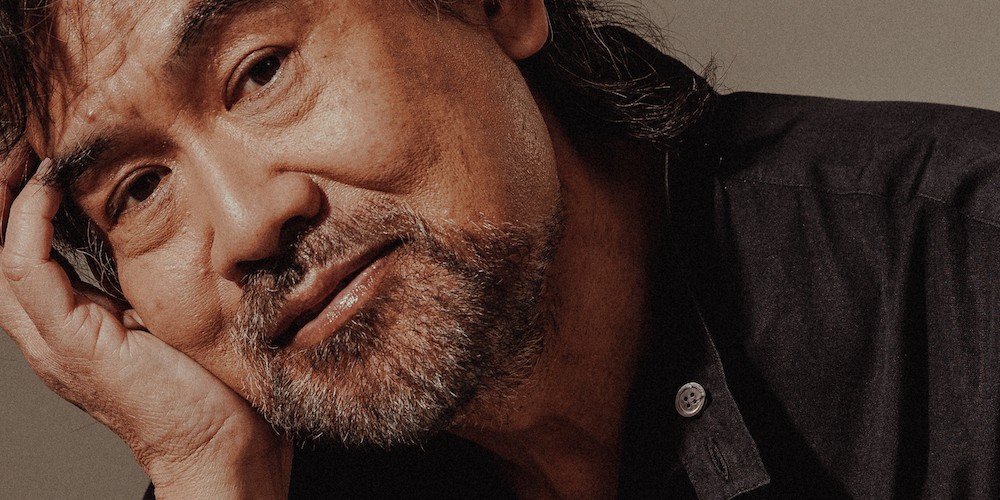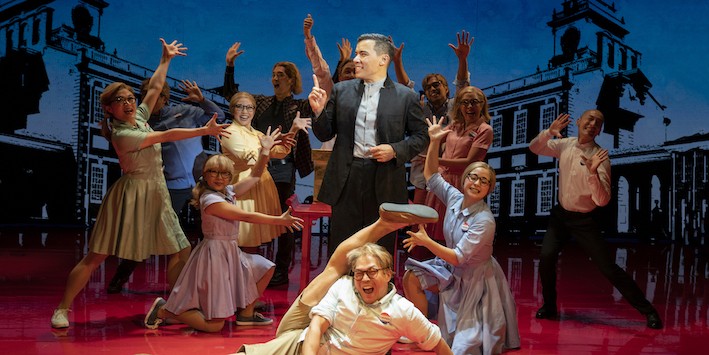This Is Who We Are: David Henry Hwang
This Is Who We Are is a series featuring Columbia School of the Arts’ professors, covering careers, pedagogy, and art-making during a pandemic. Here, we talk with Associate Professor of Theatre and Playwriting Concentration Head David Henry Hwang about his most recent projects, the challenges of collaboration in the Zoom era, and the power of authenticity in art.
Last March, COVID-19 emerged as a long term threat to our health and our patterns of daily living. Activities we might have taken for granted—dining in a restaurant, booking plane tickets, or seeing a Broadway show—became unavailable as state and local governments moved to stop the spread of the virus. Almost a year later, with over 51 million fully vaccinated Americans, many of the country’s most hard-hit industries have managed a slow return to normal.
But Broadway, one of New York City’s most defining and beloved features, remains closed, not expected to reopen until September of 2021. Despite the necessary but disheartening closures, many artists have demonstrated considerable resiliency, creating virtual projects or working in anticipation of the day when their art will have an in-person audience again.
Professor Hwang is one such creator who has kept busy during this time, juggling many writing projects as he waits for live performance to return. “I think writers are really lucky in that regard,” Hwang says. “So much of what we do is in our rooms by ourselves anyway, so we're kind of well suited for this moment. But of course, if you're a script writer, there's a part you do alone in your room, and then there's a part you do that’s in collaboration, and it has been much harder to do collaboration. For obvious reasons. You can have meetings over Zoom, and you can get a certain amount of work done, but it's not as satisfying as being in a room.”
Currently, Hwang is working on three different projects for theatre: rewrites of musicals Soft Power and Aida and a new show that explores the radical history of Asian America in the 1960s. Soft Power, with book and lyrics by Hwang and additional lyrics by Jeanine Tesori, is a reversal of the exoticization in Rodgers and Hammerstein’s musical The King and I, which centers on the relationship between the King of Siam and a British school teacher named Anna who is hired to help the king modernize his country.
In the first iteration of Soft Power, a Chinese national travels to the US to help President Hillary Clinton solve the problem of gun violence. “We did a reading of that version the morning of the 2016 election, and the next morning, we realized that the show was going to have to change,” Hwang says.
Shortly after the 2016 election, Hwang was attacked outside of his apartment in Brooklyn. The assailant, who has never been identified, stabbed Hwang in the neck, severing his vertebral artery in the near-fatal attack. Some thought it was a gang initiation, but police weren’t sold on that theory. In an article for The New York Times, Hwang writes, “Because I’m Asian-American, others argue it may have been a hate crime. I have since learned that Asians are seen as easy targets because of perceived language barriers and a reluctance to report crimes.” Then, as now, the US was seeing an increase in attacks on Asian Americans.
“My stabbing wasn't part of the original concept of the musical,” Hwang says. “But at a certain point, as I was writing the first draft, I just started writing about my stabbing, and I felt like, ‘Oh, this is just something I need to do to process it. It's never going to stay in the show.’ But then it turned out to be kind of a pivotal plot event in the show. An autobiographical character gets stabbed, and then has this fever dream of a musical.”
Hwang began research for his newest theatre project, which focuses on 1960s Asian America, during the pandemic. He cites the murder of George Floyd and the recent hate directed towards Asian Americans as affirmation of BIPOC Americans’ shared interest. “So I started to focus on the San Francisco State University Third World student strikes of 1968,” Hwang says. “Prior to that time, you have Asian Americans who are associated largely with progressive politics, with labor movements. That whole model minority stereotype, this notion that Asians don't suffer from racism, that we're wealthy, that we're educated, that we've sort of made it in America, that was much less prevalent before 1968.
“And that model minority stereotype is also used by the right wing as a wedge to say to other minorities, other people of color, ‘Well, it's your own fault, if you're not doing well, because the Asians are,’” Hwang continues. “I'm interested in this moment of revisiting the past and the unity that existed between different—what were then called—Third World groups. And how that is powerful in 1968, with the student strikes, but also you see the germs of what will become the model minority myth start to emerge in that same year.”
Hwang is also at work on various projects for television and film. He is writing the live action feature musical remake of Disney’s The Hunchback of Notre Dame and a film about Anna May Wong, considered to be the first Chinese American Hollywood movie star, to star Gemma Chan. He is also penning a pilot for a Disney+ animated series.
When it comes to managing his many projects, Hwang says, “For most theatre, film, and television artists who are lucky enough to be employed, we do a lot of things because it takes so long for anything to get produced. It easily takes five to ten years for a musical, the same way that you can develop a TV show for many years, and screenplays get developed for decades, without getting made. So there's a lot of downtime. I think we all kind of create these Tetris schedules, ‘Oh, I can get a little work done on this while this one's down.’ Another analogy, it’s like having a lot of planes that are waiting to land and you just kind of hope that you don't have three that are supposed to hit the runway at the same time. Although that happens.”
In addition to his creative projects, Hwang has been teaching several virtual classes: a rewriting class, a professional development class, and a collaboration class, which he co-teaches with Directing Concentration Head Anne Bogart and Dramaturgy Concentration Head Christian Parker. “I'd say that teaching writing on Zoom is the least bad,” Hwang says. “Because you can get actors together, and you can hear the script over Zoom, and it's glitchy, but you can get some good work done. Collaboration has been really hard. We tried to push this class back as long as we could, hoping that somehow things would open up sooner. People have been really creative, and most of the presentations are being done remotely. There’s some interesting experimentation that's going on, which I think could be useful, even when we come out of this, to our stagecraft or even live productions. So it's not a total loss, but it's certainly not ideal.”
To aspiring artists, Hwang says, “The thing that makes you unique, the thing that makes you idiosyncratic, the thing that makes you weird, that’s your superpower as an artist. Because when you draw from that, you're creating the thing that only you can make. And I think that is incredibly appealing, from an aesthetic standpoint, an artistic standpoint. And also, I would argue from a career standpoint. I think it's incredibly hard to guess what people want. I don't know how to game that system. But audiences, gatekeepers, critics, respond to something that feels genuine, unique. And like the thing that only that artist could have created.”
A playwright, screenwriter, television writer, and the most-produced living American opera librettist, Hwang’s works for stage include M. Butterfly, Chinglish, Yellow Face, Kung Fu, Golden Child, The Dance and the Railroad, and FOB, as well as the Broadway musicals Elton John and Tim Rice’s Aida (co-author), Flower Drum Song (2002 revival), and Disney’s Tarzan. He was a Writer and Consulting Producer for the Golden Globe-winning television series The Affair, and his screenplays include Possession, M. Butterfly, and Golden Gate.
Hwang is a Tony Award winner and three-time nominee, a three-time OBIE Award winner, and a three-time Finalist for the Pulitzer Prize in Drama. His works have been honored with two GRAMMY Awards, and he co-wrote the Gold Record Solo with the late pop star Prince. Currently, he serves as Chair of the American Theatre Wing, which founded the Tony Awards and presents the OBIE Awards.

